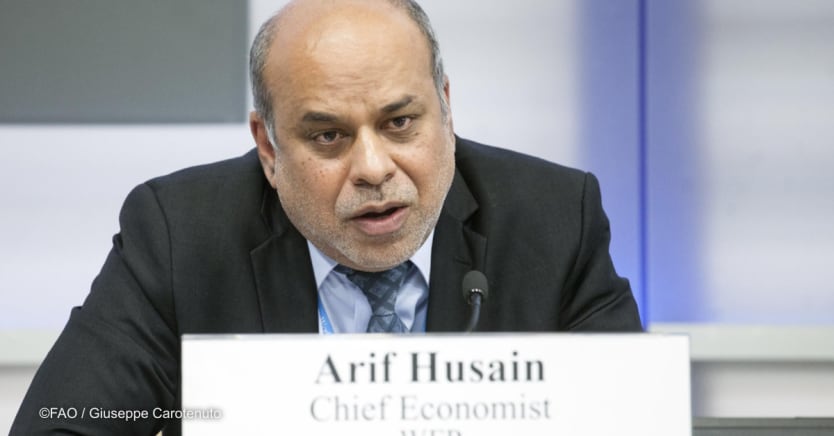
The ongoing Twitter feud between the World Food Programme and Tesla boss Elon Musk is seen inside the United Nations agency as a chance to set the record straight on its operations and spending while also prompting a rethink on its messaging.
Arif Husain, WFP’s chief economist, told Devex on Friday that the global hunger crisis is real and getting worse due to a rise in conflicts, increasing climate change, and the COVID-19 pandemic — but that Twitter is not the best place to discuss such complex issues, especially with potential donors.
“There are 43 countries with people in [food security] emergencies. We didn’t make that up,” Husain said. “If you accept that there is a problem … then we need to solve that problem. So, that’s where the discussion needs to be: What will it take to solve this problem?”
The worsening situations in places such as Afghanistan, Yemen, and Ethiopia are driving the spike in numbers, as WFP sounds alarm bells. Over the past three years, the number of people facing acute food insecurity has more than doubled to 270 million, according to the agency.
Elon Musk-WFP Twitter 'feud' raises accountability questions
Billionaire Elon Musk has challenged the World Food Programme's claim that a $6 billion donation would create global food stability, raising questions about how WFP and similar organizations might attract wealthy philanthropists to their causes.
The recent dust-up with Musk stemmed from WFP Executive Director David Beasley saying the agency needed more than $6 billion to feed some 42 million people and suggesting that Musk, whose wealth has skyrocketed in recent years, could easily fill the gap. Musk in turn asked WFP to throw open its books and show the efficacy and efficiency of its operations, saying he would sell Tesla shares if he were to be convinced.
In the days since, WFP has waged an extensive public relations campaign to explain Beasley’s figures and demonstrate its commitment to accountability and transparency.
Husain went over the math with Devex. The average cost globally to provide one meal for one person is 43 cents, which, if multiplied by the number of people in need and 365 days, is about $6.6 billion for a year, he said.
But money is just a “stopgap,” he added, and solving world hunger is not purely a financial issue.
“Unless you sort out the conflicts, there is no way the numbers are coming down,” Husain said. “It is not just money; it’s money and creating enabling conditions to get people out of hunger, poverty, and destitution.”
With the rise of a new class of billionaires, WFP might increasingly find itself turning to individuals — rather than governments or long-standing foundations — for financial support. This could mean it has to adjust its messaging to potential donors and the general public.
“The onus is for us to provide information for people to know us. That’s a fair ask,” Husain said.
And yes, he promised to present accounting ledgers and plans so that Musk and others can see how WFP works.
Husain also said that while Musk had been the target of WFP’s most recent effort to engage with potential megadonors, it ultimately did not matter whether the Tesla chief or some other wealthy individual were the one to provide funding.
“Just remember this: Elon Musk is a representative of a group, right?” Husain said. “This message is not just for Elon; it is for all people of high worth individually who can come in and help to do that.”
WFP’s immediate goal — which Beasley has mentioned in recent days — is for wealthy people to make one-time donations as a stopgap measure to help provide food to people in need, especially those in the countries most affected by COVID-19, conflict, and climate change.
Even as back offices scramble to put together the data, Musk has continued to tweet about the issue, questioning the United Nations' efficiency and whether dollars intended for the hungry end up reaching them or lining the pockets of intermediaries.
“Publishing their transaction ledger would clarify matters,” Musk said Thursday on Twitter.
The public relations campaign has been tough for WFP, but Husain said it can yield positive outcomes in the end.
“There are people who don’t like the U.N., people who don’t know WFP. That’s why I think this is an opportunity. We take this very seriously. Elon Musk is helping us shine a light on one of the biggest problems the world is facing today, which is the hunger and the devastation.”
“The onus is for us to provide information for people to know us. That’s a fair ask.”
— Arif Husain, chief economist, WFPMusk, who is currently listed as the wealthiest person in the world, isn’t known for being especially open about his own philanthropy — though he has announced multimillion-dollar commitments to addressing climate change and other issues this year.
And whether he is genuinely interested in accountability and transparency at WFP remains unclear. Some philanthropy experts suspect he might be “trolling” Beasley. Still, Musk has raised questions about how development agencies function and increased scrutiny of their operations.
However, Husain said WFP’s financial statements are public and available to any interested donor.
“I mean, you could also look at our APRs — annual performance reports. It’s a public document,” he said. “All 2020 is in there — you know, what we do, how we do it.”
WFP’s most recent annual report was published in June.









